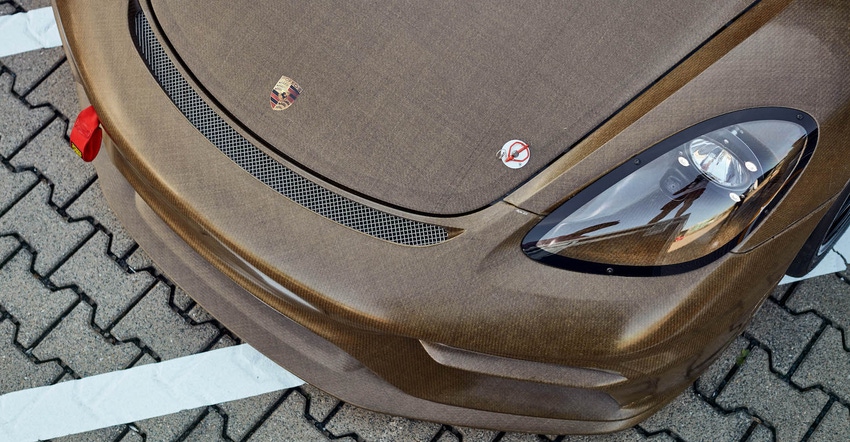Front and rear aprons, front spoiler, and front and rear lids are among the sustainable components.
October 2, 2020

The Porsche 718 Cayman GT4 Clubsport MR that tackled this year’s Nürburgring 24-hour race in late September featured a complete body kit made of natural-fiber composite materials for the first time.
Since early 2019, Porsche manufactured the two doors and the rear wing of the small series racing vehicle out of a natural-fiber mix, sourced primarily from renewable raw materials. Now for the first time, the front and rear aprons, the front spoiler, front and rear lids as well as the mudguards and diffuser including the aerodynamic fins are also made of this regenerative material.
These materials replace the metal and plastic injection molded components of the production sports car. In terms of weight and stiffness, the recyclable natural-fiber composite materials of non-structural components share properties similar to carbon-fiber composites (CFRP) and meet the same high safety and quality standards. Natural-fiber composites can be manufactured more economically and with less energy.
|
Porsche 718 Cayman GT4 Clubsport MR with natural-fiber composite body kit. Image: Porsche |
Farmed flax fibers that don't conflict with food crops serve as the basis of the sustainable natural-fiber composite material. This development began in 2016 with collaboration between Porsche, the Federal Ministry of Food and Agriculture (BMEL), the Fraunhofer WKI, and the Swiss company Bcomp. At the 24-hour race, the team Four Motors joins forces with Project 1 Motorsport to take the natural-fiber 718 Cayman GT4 Clubsport MR through its first test at race speed.
For the doors, light balsa wood serves as the core of the composite material. The sandwich construction correlates to the well-known resin transfer moulding (RTM) process used in the production of carbon-fiber components. By contrast, for the rear wing, layers are impregnated with epoxy resin then baked in an autoclave. The newly added components made of natural-fiber reinforced plastic are created using a vacuum infusion process and contain Bcomp’s proprietary powerRibs technology to fulfil stiffness requirements.
Materials of varying thicknesses and fiber orientations ensure the precise adjustment to specific purposes and load scenarios. Natural-fiber composite materials are particularly suited to areas that are not or only partially part of the vehicle structure. Moreover, the damping of vibrations improves five-fold and, in the case of an accident, splinter into larger and less sharp pieces.
Fitted with a natural-fiber composite material body kit and powered by a 3.8-litre flat-six engine producing 313 kW (425 hp), the 718 Cayman GT4 MR took up the Nürburgring 24-hour race sporting the starting number 420. The cockpit was shared by Matthias Beckwermert, Henrik Bollerslev, Nicola Bravetti and Marco Timbal. The vehicle does not have homologation to compete in the SRO racing series. If the test outing at the endurance classic goes well, it is likely that Manthey-Racing will offer the parts kit to customers.
About the Author(s)
You May Also Like




